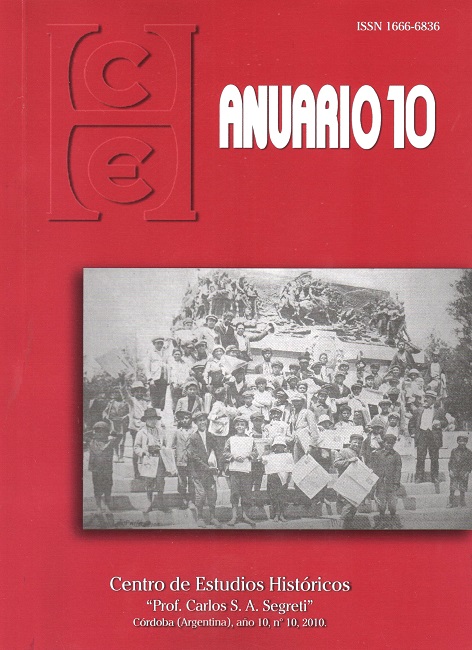Taming the water to rule. Socio-political conceptions of nature and society in the context of the consolidation of the Mendoza provincial state towards the end of the 19th century and the beginning of the 20th century.
DOI:
https://doi.org/10.52885/2683-9164.v0.n10.23147Keywords:
distribution of water, nature, sociopolitical projects, StateAbstract
In Mendoza, the consolidation of the State was at the end of the nineteenth century, after decimating the indigenous populations from southern. After that the State could extending its sovereignty over these territories. This involved the construction of regional identity and ethnic markers associated with access to key resources such as water and land. In this article, we investigate the hegemonic provincial projects about distribution of water and space from the late nineteenth and early twentieth century and its implications for a given social and territorial formation. Sarmiento and “water tamers” were writers, engineers, politicians and officials who thought and action in favour of a modern social institution based on a series of theoretical prescriptions involving a strong control and reorganization of nature, designed to consolidate an agro-economic model of specialization. Far from promoting the achievement of the ideals of modernity, this model implied a social structure associated with a system of capitalist nature, where the water resource was one of the articulators that determined the place of every social group in the model of accumulation that consolidated.
Downloads
References
ABRAHAM Elena y PRIETO María del Rosario, Vitivinicultura y desertificación en Mendoza. Estudios sobre historia y ambiente en América, México, El Colegio de México, Instituto Panamericano de Geografía e Historia, 1999.
ALIMONDA Héctor y PARREIRA Carlos (orgs.), Políticas públicas ambientais latino-americanas, Brasilia, Editorial Abaré, 2006.
ARGUMEDO Alcira, Los silencios y las voces en América Latina. Notas sobre el pensamiento nacional y popular, Buenos Aires, Ediciones del Pensamiento Nacional, 2006.
CAJIGAS-ROTUNDO Juan Camilo, “La biocolonialidad del poder. Amazonía, biodiversidad y ecocapitalismo”, CASTRO-GÓMEZ Santiago y GROSFOGUEL Ramón (eds.), El giro decolonial. Reflexiones para una diversidad epistémica más allá del capitalismo global, Bogotá, Iesco-Pensar-Siglo del Hombre Editores, 2007.
CHAMBULEYRON Jorge, “La cultura del agua: de la acequia colonial a los grandes embalses”, ROIG Arturo, LACOSTE Pablo y SATLARI María Cristina (comp.), Mendoza, cultura y economía, Mendoza, Caviar Bleu, 2004.
DESCOLÁ Philippe, “La Antropología y la cuestión de la naturaleza”, PALACIO Astrid y ULLOA Germán (eds.), Repensando la naturaleza. Encuentros y desencuentros disciplinarios en torno a lo ambiental, Bogotá, Universidad Nacional de Colombia, 2002.
ESCOLAR Diego, Los dones étnicos de la nación. Identidades huarpe y modos de producción de soberanía en Argentina, Buenos Aires, Prometeo, 2007.
FOUCAULT Michel, Seguridad, Territorio, Población, Buenos Aires, FCE, 2006.
HARVEY David, A brief history of neoliberalism, N.Y., Oxford University Press Inc., 2005.
JITRIK Noé, “Prólogo”, Domingo F. SARMIENTO, Facundo, Caracas, Biblioteca Ayacucho, 1977.
LEFF Enrique, “La ecología política en América Latina. Un campo en construcción”, ALIMONDA Héctor (comp.), Los tormentos de la materia. Aportes para una ecología política latinoamericana, Buenos Aires, CLACSO, 2006.
LLOP Armando y BERTRANOU Armando, El agua y el desarrollo regional en el Centro Oeste argentino: estado de desarrollo de las cuencas hídricas y necesidades de investigación, Mendoza, Instituto Nacional de Ciencia y Técnica Hídrica/Centro de Economía, Legislación y Administración del Agua, 1981.
MATEU Ana María, Entre el orden y el progreso 1880-1920, Mendoza, Caviar Bleu, Editorial Andina Sur, 2004.
MONTAÑA Elma, Agua y equidad territorial en Mendoza, Argentina, Mendoza, CONICET- INCIHUSA, 2006.
OLASCOAGA Juan Manuel, “Aguas Perdidas”, OLASCOAGA Juan Manuel, Topografía Andina-Aguas Perdidas, Buenos Aires, Junta de Estudios Históricos de Mendoza, Cabaut y Cía., 1935 [1908].
PALACIO Germán, “Breve guía de introducción a la Ecología Política (Ecopol): Orígenes, inspiradores, aportes y temas de actualidad”, Revista Gestión y Ambiente, Bogotá, vol. 9, núm. 3, 2006.
PALCOS Alberto, “Prólogo y notas”, Domingo F. SARMIENTO, Facundo, Ediciones Culturales Argentinas, 1961.
SANJURJO DE DRIOLLET Inés, La organización político-administrativa de la campaña mendocina en el tránsito del antiguo régimen al orden liberal, Buenos Aires, Instituto de Investigaciones de Historia del Derecho, Dunken, 2004.
SCAVINO Dardo, Barcos sobre la Pampa. Las formas de la guerra en Sarmiento, Buenos Aires, El Cielo por Asalto-Imago Mundi, 1993.
SOLODKOW David, “Racismo y Nación: Conflictos y (des)armonías identitarias en el proyecto nacional sarmientino”, Decimonónica, vol. 2, núm. 1, 2005.
TERÁN Oscar, Para leer el Facundo. Civilización y Barbarie: cultura de fricción, Buenos Aires, Capital Intelectual, 2007.
VITALI Galileo, Hidrología mendocina. Contribución a su conocimiento, Mendoza, Zeta Editores, 2005.
Downloads
Published
How to Cite
Issue
Section
License
Aquellos autores/as que tengan publicaciones con esta revista, aceptan los términos siguientes:
- Los autores/as conservarán sus derechos de autor y garantizarán a la revista el derecho de primera publicación de su obra, el cuál estará simultáneamente sujeto a una Licencia de reconocimiento de Creative Commons. Se puede compartir, copiar, distribuir, ejecutar y comunicar públicamente la obra, siempre que: a) se cite la autoría y la fuente original de su publicación (revista, editorial y URL de la obra); b) no se use para fines comerciales; c) no se altere, transforme o genere una obra derivada a partir de esta obra.
- Los autores/as podrán adoptar otros acuerdos de licencia no exclusiva de distribución de la versión de la obra publicada (p. ej.: depositarla en un archivo telemático institucional o publicarla en un volumen monográfico) siempre que se indique la publicación inicial en esta revista.
- Se permite y recomienda a los autores/as difundir su obra a través de Internet (p. ej.: en archivos telemáticos institucionales o en su página web) después del proceso de publicación, lo cual puede producir intercambios interesantes y aumentar las citas de la obra publicada. (Véase El efecto del acceso abierto).


